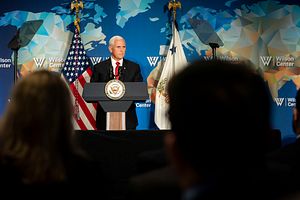On October 24, U.S. Vice President Mike Pence gave his second big speech on China at the Wilson Center in Washington, D.C. The speech, first planned for this past June, was initially delayed ahead of the G-20 meeting in Japan where U.S. President Trump and China’s Xi Jinping met on the sidelines of the summit. A series of meetings have since taken place in a bid to find a breakthrough or at least some kind of progress on trade negotiations.
Some have portrayed Pence as taking on the role of “bad cop,” giving Trump greater leeway when engaging with Xi and other Chinese interlocutors to “make a deal.” The U.S.-China relationship will undoubtedly be one of the most consequential inter-state relationships in the 21st century and leaders in both countries face the challenge of how to frame it. While the White House states that it seeks to forge a relationship with China founded on “candor, fairness, and mutual respect” and to hold the country accountable, tough talk on China has been a common feature of the current administration.
If there were any doubts about a shift in the United States about how it views China, Pence’s speech reinforced a decidedly antagonistic standpoint. For example, Pence explicitly painted China as “a strategic and economic rival for the United States.” Moreover, he strongly criticized previous notions that U.S. economic engagement could help pave the way for China’s transition toward broader social and political liberalization.
In his previous China-related address, at the Hudson Institute last year, Pence delivered hawkish remarks criticizing Beijing for “malign influence and interference in American politics and policy.” In his latest remarks, Pence’s tone vis-a-vis China struck many of the same chords.
Although economics, trade, and intellectual property issues featured prominently, the vice president spoke out against China on a wider array of issues, including its attempt to expand its military footprint and its human rights record. Pence invoked Washington’s latest visa restrictions against officials and sanctions against Chinese companies for their involvement in repression against Uyghurs in Xinjiang. He also condemned Beijing’s larger efforts to “eradicate” distinct religious and ethnic identities.
Beijing for its part, still under pressure from existing U.S. economic measures, is not likely to take kindly to the address. Pence was unequivocal on the U.S. position to defend Taiwan’s freedoms and characterized the island as a “beacon of Chinese culture and democracy.” Even more pronounced was Pence’s backing of Hong Kong protesters who have been taking to the streets for months now. He praised Hong Kong for its free economy, free press, and independent legal system, describing the city as “a living example of what can happen when China embraces liberty.” Nevertheless, while he conveyed that the United States stands with Hong Kong, he pressed protesters to remain nonviolent as clashes with local authorities have been on the rise.
The speech did not target Beijing and Chinese state-backed entities alone: American businesses and the U.S. political establishment also came under fire. “Far too many American multinational corporations have kowtowed to the lure of China’s money and markets by muzzling not only criticism of the Chinese Communist Party, but even affirmative expressions of American values,” said Pence. He explicitly called out Nike and the National Basketball Association in light of the recent tensions over Hong Kong.
Pence not only spoke of the impact of Beijing’s actions in relation to the interests of the United States, but also commented on Beijing’s influence across the globe. He was notably critical of what he described as China’s export of censorship and technological capabilities to develop a surveillance state.
However, within the Trump administration, policies and messaging emanating from various parts of the executive branch have had a tendency of being somewhat fluid. Pence’s latest comments should be understood within the complexities of that fluidity.

































